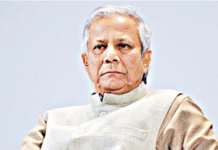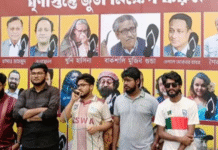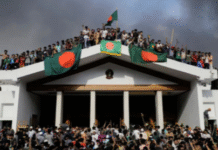Star Online Report
The nation paid glowing homage on Thursday to the Language Movement martyrs who laid down their lives for the mother tongue in 1952.
When the clock struck 12:01am Thursday, thousands of barefoot people from all strata of life converged on shaheed minar built across the country breaking the silence of the night.
Prime Minister Sheikh Hasina led the nation in paying tributes to the Language Movement martyrs by placing wreath at the Central Shaheed Minar as the immortal song on Amar Ekushey ‘Amar Bhayer Rakte Rangano Ekushey February’ was being played.
The PM stood in silence for some time.
President Zillur Rahman, who usually is the first to pay homage, did not show up.
Later, speaker of parliament, Dhaka University authorities, ministers, attorney general, members of the diplomatic corps, various political, cultural and professional bodies paid homage to the martyrs one after another.
Later, Hasina, along with her cabinet members, advisers and party lawmakers placed another wreath on behalf of the ruling Awami League.
The chiefs of the three services, the attorney general, members of the diplomatic corps and representatives of the UN organisations, and Dhaka University Vice Chancellor Prof Dr AAMS Arefin Siddique also placed wreaths.
Acting secretary general Mirza Fakhrul Islam Alamgir of the main opposition party BNP, along with other senior leaders, placed wreath on behalf of BNP Chairperson Khaleda Zia.
A representative team of the Shahbagh protesters, who have been tirelessly demanding capital punishment of all Liberation War criminals for the last 16 straight days, paid homage to the language martyrs at the Central Shaheed Minar.
The Central Shaheed Minar was then opened to all.
The day is globally being observed as the International Mother Language Day. The song Amar Bhayer Rakte Rangano Ekushey February, Ami ki Bhulite Pari would be sung in 193 countries in the world.
Besides, different political parties and their front organisations and various socio-cultural organisations also placed wreaths at the shaheed minar paying their homage to the language martyrs.
Stringent security measures were taken in and around the Central Shaheed Minar on the occasion.
On this day in 1952, students and people from all walk of society took to the streets in Dhaka to protest the then Pakistan government’s refusal to recognise Bangla as one of the state languages and imposition of Urdu as the only official language of Pakistan.
Salam, Barkat, Rafiq, Jabbar and a few other brave sons of the soil sacrificed their lives on this day to establish Bangla as one of the state languages of the then Pakistan.
The day has since been observed as the Language Martyrs Day, which the Unesco later declared as the International Mother Language Day.
The Pakistan government was ultimately compelled to include an article in the country’s constitution on February 29, 1956 that declared, “The state languages of Pakistan shall be Urdu and Bengali.”
The Language Movement is indeed the most important turning point in the history of Bangalees as its spirit led to the independence of Bangladesh.
On November 17, 1999, the Unesco declared February 21 as the International Mother Language Day. Countries across the globe have been observing the day since then to promote linguistic diversity and multilingual education and raise awareness of cultural traditions based on understanding, tolerance and dialogue.
Sheikh Hasina and Khaleda Zia in their separate messages on the occasion of Amar Ekushey, International Mother Language Day, felicitated the Bangla-speaking people and others around the world.
The Central Shaheed Minar and its adjacent areas have had a facelift on the occasion, and roads and medians have been festooned with Bangla alphabets and the national flag.
The day is a public holiday. The national flag was hoisted at half-mast atop all government, autonomous and private buildings.
Bangladesh Betar, Bangladesh Television and satellite TV channels are airing special programmes.
Source: The Daily Star









